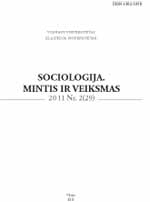Sąjūdžio tapatybės beieškant: sovietinės reflektyviosios modernybės bruožai Lietuvoje
In Search of a Sąjūdis Identity: Features of Soviet Reflexive Modernity in Lithuania
Author(s): Justinas DementavičiusSubject(s): Essay|Book Review |Scientific Life
Published by: Vilniaus Universiteto Leidykla
Keywords: Sąjūdis; identity; reflective modernity; multi-issue social movement
Summary/Abstract: This article aims to present the case for a distinctive Sąjūdis identity (Sąjūdis is the Reform Movement of Lithuania) as the basis for consolidating a social movement capable of integrating otherwise diverse networks and social groups in Lithuania during the Perestroika era. Following M. Castells, it explores the self-definition, adversaries and societal goals of the movement as presented by Sąjūdis officials in the first months of its activity, when Sąjūdis actually became ‘the movement of all Lithuania’. The article’s basic claim is that the popularity of Sąjūdis can be explained by its self-representation as a neo-Soviet and multi-issue social movement. In the first case, Sąjūdis was developing a critique of the ‘stagnating Soviet regime’ by using arguments already approved by reformist wing of the Communist party, and thus representing a specific Soviet reflexive modernity. At the same time, as a multi-issue social movement, Sąjūdis took in diverse problems (mainly ecological, social, economical, educational and last and least political), and did not focus on questions of national or state independence as is usually claimed.
Journal: Sociologija. Mintis ir Veiksmas
- Issue Year: 2011
- Issue No: 02
- Page Range: 218-243
- Page Count: 26
- Language: Lithuanian

